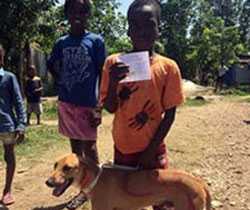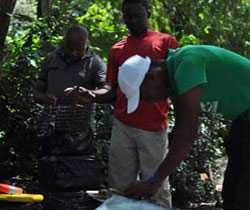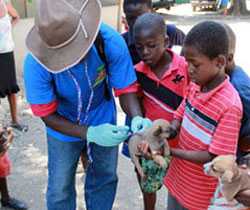Rabies in Haiti
Haiti is one of five remaining countries in the Americas where canine rabies continues to cause human deaths. It has the highest rate of human rabies deaths in the western hemisphere, with an estimated 2 each week. Yet only about 7 of these human rabies deaths are reported to health authorities each year due to inconsistencies in case detection, limitations in diagnostic capacity, and lack of awareness and education about the disease among Haitians and medical providers.
In 2013, the Government of Haiti along with CDC and other partners began an animal rabies surveillance program in several regions in Haiti, and saw an 18-fold rise in detection of rabid animals. In 2015, CDC evaluated Haiti’s canine rabies vaccination program and found that only 45 percent of dogs were vaccinated as a result of the campaign, far short of the 70 percent needed to stop rabies spreading in the dog population. In addition, the researchers found that Haiti has nearly twice as many dogs as previously thought.
Since then, CDC and its partners have assisted in the development of local capacity for animal rabies vaccination and surveillance, and trained animal health workers in managing mass dog vaccination campaigns. So far this year, they have vaccinated 110,000 dogs through September 2017.
An essential part of this success was the use of a new mobile phone app designed by the nonprofit Mission Rabies that helps track canine rabies vaccination campaigns in near-real time. The app has been helpful in monitoring campaign success and directing where the vaccination teams should go to reach dogs that need vaccination. The ultimate goal is a 70 percent nationwide dog vaccination rate. If sustained for 5 years, this level is anticipated to disrupt rabies transmission.


Haitian boy holds out the certificate of rabies vaccination for his dog.

Team of rabies surveillance officers prepares traps for mongooses, another animal known to spread rabies in the Caribbean islands, to study the rabies burden in this animal population.
- Page last reviewed: September 28, 2017
- Page last updated: September 28, 2017
- Content source:


 ShareCompartir
ShareCompartir
